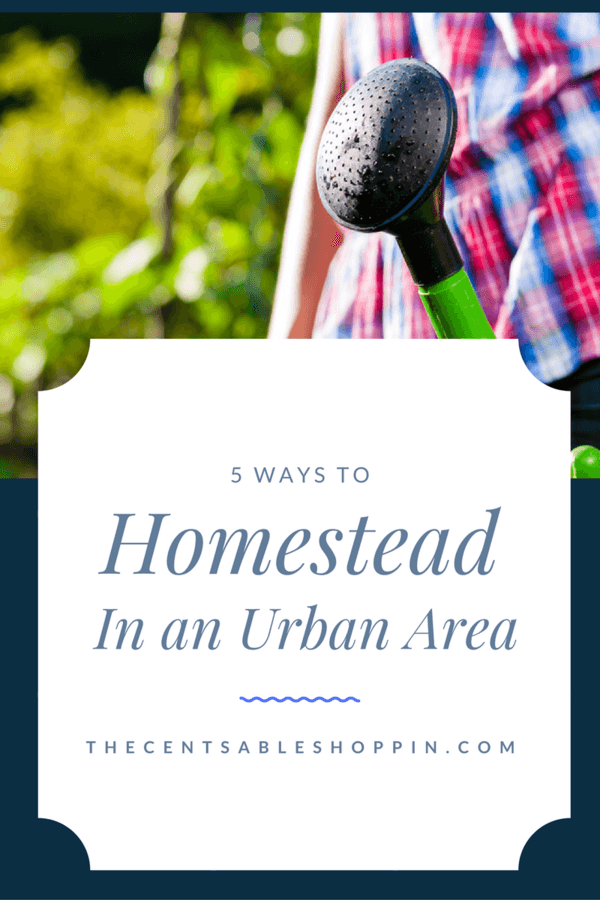
Is it possible to have a homesteading way of life in a neighborhood? I think so – but I also think that it’s more about the value system than the location you are in.
Do you value your meals? Food? Your family?
Growing up as a kid, I never thought I’d be living in a house with a block wall in my backyard. I also never thought I’d ever be living in an apartment (which we have done) or… in an old military building – it just wasn’t ever on my radar.
We grew up about ten miles out of town – our town was less than 500 people. The neighboring town had just over 2,000 residents. With over 8 acres of land, we were squashed between a dairy farm and a pig farm, nestled right across from cornfields that had combines running as they harvested the corn.
My brothers and I spent a majority of our time in our woods – making trails and forts… or running through the cornfield trying to hide from each other. We caught salamanders and lizards in our plastic kiddie pool, in some cases over 50 at a time. We would take the trash out to the incinerator in the FAR back of the backyard, in nothing but our PJ’s and shoes – because nobody ever drove down our country road unless it was a farmer on his tractor.
Then there were the days that my parents had to drive to the neighbors to pull us out of the barn because were were drinking milk fresh from the bulk tank with the kids next door. While scoffed at now, we never came in the house for water because we could turn the hose on in the backyard and put it up to our mouth – rarely ever were we sick.
Though once I graduated and went off to the military, I realize that not everyone has the opportunity to live on 8 acres of beautiful country amidst farms and tractors. From that moment, and up until now, we have lived in small residential houses or apartments from Georgia to Seattle, to Sierra Vista.
I am NO expert when it comes to having a homestead in way of life, but we have taken some steps to create a small space amidst the lack of acreage and block wall we look at daily when we open the back door.
Buy Local as Much as you Can
The next best thing to having a garden is to buy local – someone other than your grocery store. Find a local Farmer’s Market that you can visit weekly for your produce. Buy your meat from a local Farmer…. or join a CSA – even if it’s by the week.
You might even be able to buy your eggs from a local farmer or your local CSA too – not only will you help support the local farming community, you will see a huge difference in the quality of your food.
Use Cloth
Simplify your life and ditch paper towels in lieu of cloth kitchen towels that you can wash and reuse. Do the same for your your babes and opt to cloth diaper instead of buying disposables.. You’ll save a ton of money, and avoid the need to always be looking for the next best deal on these items.
Hang your Clothes to Dry
Easier said than done – right? At least in my homeowners association, a clothesline is out of the question .. but, that’s not to say that we don’t have other methods. We have our own clothes rack on the back patio (several actually).. and most of the larger items do get hung outside to dry.
Diapers are amazing to hang outside – especially because the sun acts as a natural bleaching agent.
Master Basic Skills
Those skills include everything from growing food to preserving and in some cases, buying food.
Learn how to eat seasonally – which is one of the biggest skills you can develop. If you don’t garden, you might be part of a CSA – or, you might visit a farmers market. Both of those venues allow you to buy produce that is in season.. which means that you will need to learn how to save those fruits and vegetables for times when they may not be in season.
Buying locally is always more advantageous than the grocery store – you will find that locally grown produce – whether or garden, the CSA or the farmers market, tends to last much longer since it’s not trucked in from a distance.
Learn how to can your fruits and vegetables, and master recipes that will use up an overabundance of in-season produce when it is most ripe and flavorful. Lots of practice and having the right equipment available can make a tremendous difference, too!
Not only is buying local, and learning how to preserve important, being able to learn how to make things yourself helps, too!
Stock up on the pantry essentials you need to be able to learn how to make your own dinner rolls, hamburger rolls or even sour dough bread. Investing in kitchen appliances that will help you make your own yogurt, and bone broth to allow yourself the opportunity to rely on yourself instead of what is available at the grocery store.
DIY your Personal Care Products
Learning to make your own personal care items is not only a huge savings in cost vs. buying in store, you can control what goes IN to them.
Believe it or not, most of the health and beauty items in store are horrible for your skin and can lead to problems like eczema, and disrupt your immune system – they can affect your body’s pH levels, and that is just the beginning. With a few simple pantry ingredients, you can whip together your own body wash, facial care, and even shampoo.
Instead of looking to the drugstore or grocery store for vitamins and over the counters, start with a simple diet change, exercise often and make the small changes required in your life to keep yourself above the wellness line.
If you value those things like your health, your food, and even your family, then homesteading in an urban area might be something you are striving to do.




Leave a Reply
You must be logged in to post a comment.